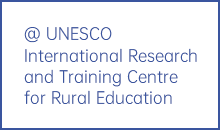Foreword
Just three years remain to achieve the Education for All and Millennium Development Goals. However, the world is still facing many tough challenges in achieving these, particularly in rural education. Rural populations contain 70 percent of the world’s poor and 72 percent of the population of the least developed countries are in rural areas and it is a huge task to ensure these populations have access to quality education, especially in a world with a financial crisis far from over and natural disasters and conflicts taking place all too often.
As a UNESCO category II centre, the International Research and Training Centre for Rural Education (INRULED) has long been working in the field of rural education through research and advocacy, education and training, knowledge management and distribution, to promote social-economic development in rural areas through education and training to achieve positive changes in the thinking and behavior of rural people.
Since my appointment as INRULED Director in October 2010 the Centre has engaged in a period of transitional ar- rangements aimed at revitalizing INRULED. Through many external and internal consultations and discussions, INRULED has decided to focus its future work on areas of skills development, teacher education, women empowerment and leadership as well as ICT in education. Projects on skills development and women leadership have already been launched while projects for the remaining focus areas are in their initial planning stages. A number of projects or activities from past years have been implemented and extended, such as the Second Dujiangyan International Forum, the Comparative Study on Technical and Vocational Education for Rural Development in the Transition Countries, Teach Future China Project, and the Sunshine Project. When implementing these projects much attention was paid to information sharing and networking.
We recognize the importance of strengthening INRULED human resource capacity in order to effectively implement our mandate through our new vision and strategic plan. In beginning this process we have recruited three programme specialists and we have plans for further staff recruitment. More importantly, INRULED has been restructured as per the advice provided by previous Board meetings, and some regulations have been revised to make the Centre work better as an international agency. And the construction of a new building for INRULED on the campus of the Beijing Normal University has started. All these have been implemented in order to better position INRULED to do its work.
These transitional processes were further strengthened and guided by our working on a new strategic plan (2012-2014), which is strongly focused on and directed by issues, comments and recommendations from Governing Board meetings held in 2009 and 2010. Four Main Lines of Action (MLAs) have been designed to be the pillars of the Strategic Plan with 12 but more comprehensive and better integrated projects for more effective implementation. The preparation and drafting of the Strategic Plan has been tediously worked out and the process included consulting with Chinese and foreign experts, regular rounds of internal discussions and feedback from consultants. In the Strategic Plan, the priorities of UNESCO, particularly the Africa priority, have been strongly echoed and INRULED’s comparative advantage of being located in China has been seriously considered.
In my capacity as the Director of INRULED and in view of the importance and feasibility of the Strategic Plan (2012-2014) to strongly support UNESCO priorities and to build networks with potential partners, I, taking the advantage of attending the UNESCO-China-Africa University Leaders Meeting held in UNESCO Headquarters in October 2011, have visited different sections of the Education Sector in UNESCO. And a delegation from INRULED has been sent to Ethiopia to conduct a survey of rural education there and explore possible cooperation with the country and the organizations.
With the solid foundation we have collectively laid since 2011, as well as with further considerations and initiatives of capacity building of INRULED, I and my colleagues are fully confident that the implementation of the Strategic Plan (2012- 2014) will lead to fruitful outcomes under the guidance of the Board and the strong support from the Chinese Government, UNESCO Headquarters, UNESCO Field Offices and UNESCO Institutes and Centres, marking a new start and a new era for INRULED.
Mr. Dong Qi
Director of INRULED
- Download:
- 2011 Annual Report













